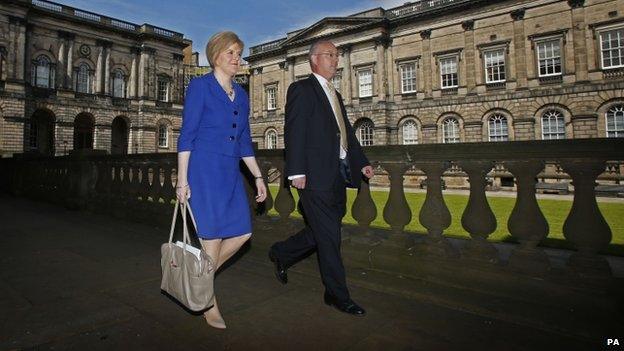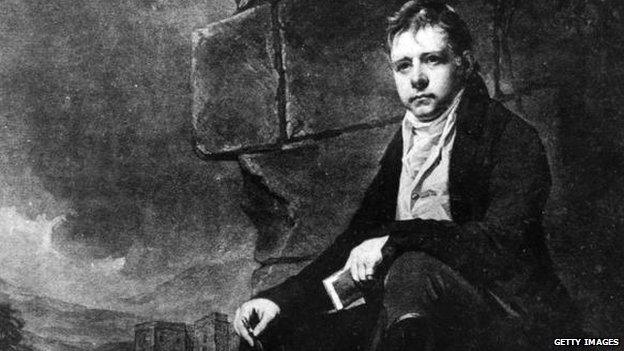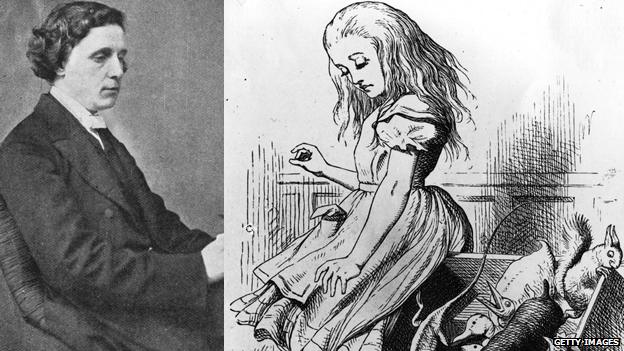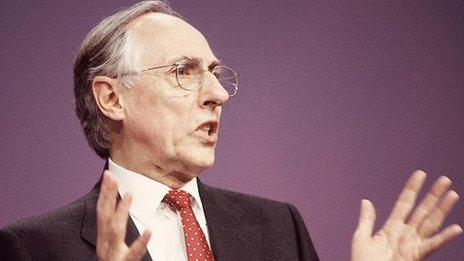Rights and rituals..... in writing
- Published

Nicola Sturgeon, walking with constitutional expert Stephen Tierney, made her speech at Edinburgh's Playfair Library
As she opened her remarks in the magnificent Playfair Library of Edinburgh University, Nicola Sturgeon disclosed that she had briefly paused in advance to gather her thoughts and gain inspiration.
Said inspiration had come from viewing in an ante-room the writing desk used by Sir Walter Scott, one of the finest authors and poets in the known universe. (Actually, that last bit is mine but I am sure she meant to say it. She certainly said she had viewed the desk with pride.)
Some observing sceptics, however, reckoned she had been studying another brilliant writer, Lewis Carroll.
She was setting out a constitution for an independent Scotland.
Given that the referendum is still months away, was that not "sentence first, verdict afterwards". Was it not a little premature?
Not so. Ms Sturgeon said it was vital to have in place the groundwork for a new state. This was not, she said, some dry constitutional point - while swiftly acknowledging that her academic and legal audience would probably prefer exactly that. They murmured appreciatively.

Background and analysis


There were two elements to the material outlined by the Deputy First Minister today. Firstly, an interim constitution. This would be the framework for the establishment of a new state.
It specifies that there shall be....
an independent state called Scotland
that Scotland would retain the Queen or successors as Head of State
that the Scottish people would be sovereign
that their will would be expressed through an elected parliament and a governing executive
that there would be an independent judiciary
and more regarding the rule of law and international relations.
The interim constitution also provides that the Scottish government "must pursue negotiations with a view to securing" nuclear disarmament and the removal of Trident.
Clause 35 of the draft Bill for this interim constitution specifies that "the Union with England Act 1707 is repealed."
When she referred to the fundamental point about independence, Ms Sturgeon noted drolly that she was inclined to add: "I like that!"
This, of course, as she acknowledged, was a reference to the comment made by Donald Dewar when introducing the proposals for devolution which turned into the existing Scottish Parliament.

Who was Nicola Sturgeon getting her inspiration from? Scots poet and author Sir Walter Scott.....

.... or Lewis Carroll, the creator of Alice in Alice in Wonderland
Perhaps Ms Sturgeon intended a suggestion that there was a degree of continuity in her proposals. That is robustly contested by her opponents.
Part two of the plan set out today is that there would be a Convention to draw up a longer term permanent constitution. Ms Sturgeon said that could enshrine wider issues. Issues which some would regard as policy based, rather than constitutional. These include the provision of free education as a right.
On a point germane to a contemporary UK controversy, she also envisages that there would be rules determining the circumstances in which Scottish military forces would go to war.
Ms Sturgeon's critics say that the content of today's draft Bill is familiar: that they would prefer to hear answers to issues like start-up costs. Scottish ministers say people are entitled to know how a new State would come about.
Opposition parties
Another development today. The three main Opposition parties at Holyrood have agreed a statement of intent with regard to the issue of more devolved powers.
In essence, this too relies upon the democratic process. Just as with Ms Sturgeon's Bill, it is open to scepticism from rivals.
Labour, the Conservatives and the Liberal Democrats each have different plans for more financial powers. Labour would devolve a greater proportion of income tax, the Tories would devolve all income tax bands and rates, the Lib Dems would give Holyrood control of a majority of its revenue raising.

Donald Dewar said "I like that" when introducing plans for devolution. It's a phrase Nicola Sturgeon repeated
In addition, they each have plans to devolve elements of welfare. As billed here before, they argue that there is common ground, that there is a Venn Diagram tracking the points where the proposals meet.
This, they say, is sufficient to provide for their statement of intent. In essence, they are saying that whoever wins the next UK General Election will be empowered to act. In practice, each party would presumably begin with their own proposal, tailored if required in the light of consultation.
So, as billed here repeatedly, no common position on the detail. Why? No time, no obvious agreement - and no real inclination given that the pending UK election drives parties towards competing rather than coalescing.
Supporters of independence say the package is imprecise - and the pledges cannot be trusted. Supporters of the Union insist they amount to a guarantee. Your choice.
Incidentally, back to the constitution. It specifies that Scotland's flag will be the Saltire - but that it will be up to the Scottish Parliament to choose a National Anthem. Perhaps that may end up as your choice too.